You’re not alone if you’ve ever witnessed your beloved Husky munching on grass in your backyard. This seemingly peculiar behavior is typical among Huskies and many other dog breeds. While it may leave you wondering why your canine companion has a sudden urge to dine on greens, rest assured that this behavior has several reasons. In this article, we’ll delve into why Huskies eat grass, exploring the instincts that drive them to do so and the potential underlying causes that might require your attention as a responsible pet owner. So, let’s unravel the mystery behind your Husky’s grass-eating habit and discover what you can do to ensure their well-being.
Why does my husky eat grass?
Huskies, like many other dogs, may eat grass for various reasons. One common explanation is that it helps with digestion, as the grass can induce vomiting or act as a natural laxative. Another possibility is that they simply enjoy the taste and texture of grass. In some cases, grass consumption can also be linked to underlying health issues or behavioral factors, so it’s essential to monitor your Husky’s behavior and consult a veterinarian if you have concerns.
The Natural Behavior Of Dogs
The natural behavior of dogs is a fascinating subject that offers insights into their evolution and instincts as domesticated animals. Understanding these natural behaviors is crucial for responsible pet ownership and building a strong bond with your canine companion. Here, we’ll delve into some key aspects of the natural behavior of dogs:
Dogs are descendants of wolves, and they retain many of their ancestors’ social and pack-oriented behaviors. In the wild, wolves live in hierarchical packs with clear leaders and followers. Dogs often exhibit similar behaviors, seeking a structured social order within their human families.
Naturally, dogs are territorial beings, expressing their territorial boundaries through automatic actions such as scent-marking and barking. These behaviors serve the purpose of safeguarding their pack or home.
Dogs possess an instinct to engage in hunting activities, including pursuing, chasing, and capturing prey. This explains their enjoyment of games like fetch and their suitability for roles like herding or hunting in certain breeds.
Dogs communicate primarily through body language, vocalizations (barking, whining, howling), and scent marking. Understanding these cues is essential for interpreting your dog’s feelings and needs.
Canines are inherently social creatures that flourish in the company of others. Early socialization is paramount as it equips them with the skills needed for positive interactions with fellow dogs and humans.
Canine companions possess an innate curiosity and drive to investigate their surroundings. This inquisitiveness aids them in comprehending their environment and adjusting to novel encounters.
Chewing and digging are instinctive behaviors for dogs. Chewing helps maintain dental health and relieves stress, while digging can serve various purposes, from searching for prey to creating a comfortable resting spot.
Play is an integral part of a dog’s life. It helps them develop social bonds, hone their physical skills, and release excess energy. Depending on the dog’s age and temperament, play can vary from gentle interactions to more boisterous games.
Instinctual Reasons For Grass Consumption
Grass consumption by dogs, including breeds like Huskies, can be attributed to various instinctual reasons. While it might seem unusual to see your furry friend munching on grass, these behaviors have deep-rooted explanations in their evolutionary history and instincts. Here are some instinctual reasons for grass consumption by dogs:
Digestive Aid: One of the primary instinctual reasons for dogs eating grass is to aid in digestion. In the wild, canids, including wolves (ancestors of domestic dogs), would consume plant material, including grass, to help them regurgitate indigestible parts of their prey, such as bones and fur. This process could assist in maintaining a clean digestive system.
Fiber Intake: Grass is a source of dietary fiber, which can benefit a dog’s digestive health. Dogs might instinctively seek out grass as a natural source of fiber, especially if they feel they need to balance their diet or alleviate mild digestive discomfort.
Nutrient Seeking: In some cases, dogs may eat grass to seek specific nutrients they lack in their regular diet. Grass can contain specific vitamins, minerals, and phytonutrients that dogs instinctively recognize as beneficial.
Purging Toxins: When dogs feel unwell or have an upset stomach, they may eat grass to induce vomiting. This instinctual behavior can help them expel toxins, irritants, or indigestible materials from their system.
Behavioral Imitation: Dogs often observe and mimic the behaviors of other animals, including other dogs. They might do the same out of curiosity or imitation if they see other dogs or animals grazing on grass.
Sensory Exploration: Dogs engage with their surroundings by using their senses, including their sense of taste. Grass might capture their curiosity, prompting them to investigate and taste it.
Instinctive Survival: In the wild, dogs’ ancestors had to adapt to various food sources depending on their availability. Eating grass might be a survival instinct, enabling them to diversify their diet when other food sources were scarce.
What Drives A Husky To Eat Grass From A Behavioral And Psychological Perspective?
Various behavioral and psychological factors can influence a Husky’s tendency to eat grass. While it’s not uncommon for dogs to exhibit this behavior, understanding the underlying motives from a behavioral and psychological perspective can provide valuable insights into why Huskies, in particular, may eat grass:
Natural Curiosity:
Huskies are naturally curious dogs. Their curiosity can lead them to explore and taste various things in their environment, including grass. This curiosity is an instinctual part of their behavior as dogs and may not always be driven by specific nutritional needs.
Boredom and Lack of Stimulation:
Huskies are an active and intelligent breed that thrives on mental and physical stimulation. Feeling bored or under-stimulated, they may resort to behaviors like grass-eating to alleviate their restlessness.
Stress and Anxiety:
Huskies are known for being sensitive to their owners’ surroundings and emotions. Stressful situations or changes in the household can trigger anxiety in these dogs, leading to abnormal behaviors like grass consumption as a coping mechanism.
Pica:
Pica is a psychological condition in which dogs compulsively eat non-food items, including grass. While the exact cause of pica is not fully understood, it may be related to genetic, environmental, and psychological factors.
Mimicking Other Dogs:
Dogs frequently acquire behaviors through observation and imitation of their canine companions. In the case of Huskies, if they witness other dogs or household animals consuming grass, they might emulate this behavior, even without a specific motive.
Taste and Texture Preferences:
Some dogs take delight in the taste and texture of grass. Gnawing on grass blades can provide a sensory experience reminiscent of how humans might find contentment in chewing gum.
Exploratory Behavior:
Huskies, similar to numerous other dog breeds, exhibit exploratory behavior as a means of familiarizing themselves with their surroundings. The consumption of grass may be a component of their innate curiosity and exploration.
How To Manage Grass Eating?
Managing grass-eating in dogs, including Huskies, involves a combination of strategies to address the underlying causes and the behavior itself. Here are some tips on how to manage grass-eating in your Husky:
- Monitor Your Husky: Monitor your Husky’s grass-eating habits attentively, taking note of the timing and identifying any potential triggers or recurring patterns. This observation will help you better understand and address this behavior in your furry companion.
- Ensure a Balanced Diet: Ensure your Husky is on a balanced and nutritious diet appropriate for their age, size, and activity level. Consult your veterinarian to determine the best food for your dog’s needs.
- Increase Fiber Intake: If your Husky appears to eat grass for digestive reasons, consider adding more fiber to their diet through vet-recommended dog food or supplements. This can help regulate their digestion and reduce the urge to seek fiber from grass.
- Provide Mental and Physical Stimulation: Huskies are active, intelligent dogs that need mental and physical stimulation to prevent boredom. Engage them in interactive games, daily walks, and puzzle toys to satisfy them mentally and physically.
- Reduce Stress and Anxiety: If stress or anxiety is a contributing factor, identify and address the sources of stress in your Husky’s environment. This might involve creating a calm and predictable routine, providing a safe and comfortable space, or using anxiety-reducing techniques recommended by a veterinarian or professional dog trainer.
- Provide Safe Alternatives: Offer safe, dog-friendly plants and herbs that satisfy your Husky’s natural desire to chew on vegetation. Consult your veterinarian to ensure these alternatives are suitable for your dog.
- Training and Behavioral Modification: Consider working with a professional dog trainer or behaviorist to address the grass-eating behavior. They can help identify the underlying causes and implement appropriate training techniques to discourage it.
Final Words
If you’ve ever wondered, “Why does my Husky eat grass?” there’s no one-size-fits-all answer. It can blend instincts, dietary preferences, stress relief, or underlying health concerns. The key is to observe your Husky’s behavior, ensure a balanced diet, and consult a veterinarian if you have any concerns. Responsible pet ownership involves understanding and addressing your Husky’s needs, even if it means letting them enjoy the occasional green snack.

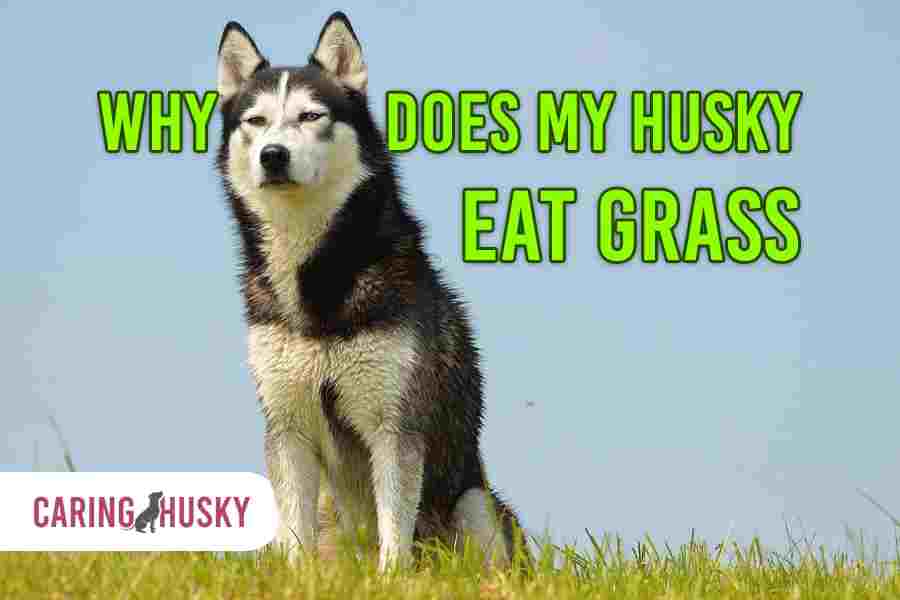
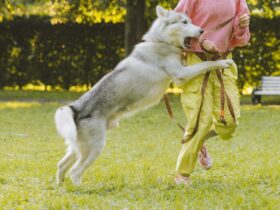

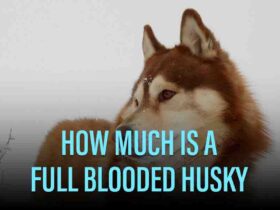
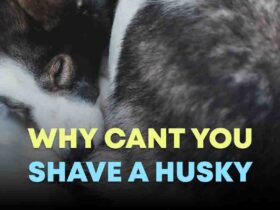
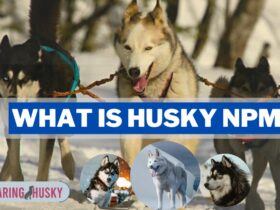
Leave a Reply